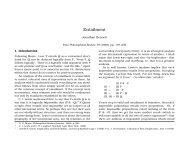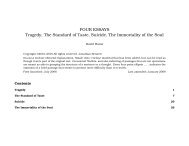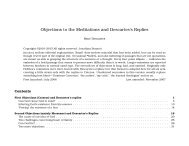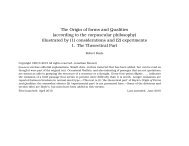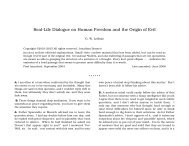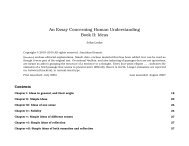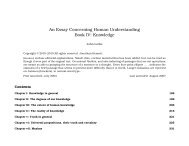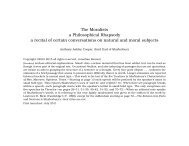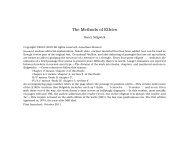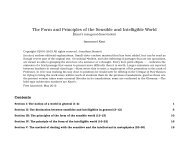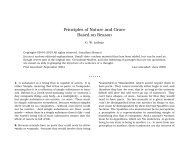A Vindication of the Rights of Woman with - Early Modern Texts
A Vindication of the Rights of Woman with - Early Modern Texts
A Vindication of the Rights of Woman with - Early Modern Texts
You also want an ePaper? Increase the reach of your titles
YUMPU automatically turns print PDFs into web optimized ePapers that Google loves.
The <strong>Rights</strong> <strong>of</strong> <strong>Woman</strong> Mary Wollstonecraft Dedicatory Letter<br />
Dedicatory Letter<br />
[This work appeared in 1792, when Talleyrand—as he is usually called today—was active in <strong>the</strong> higher levels <strong>of</strong> <strong>the</strong> developing French revolution. A<br />
Constitution establishing France as a constitutional monarchy had been established in 1791. The infamous ‘reign <strong>of</strong> terror’ was still a year away. Two<br />
years earlier, MW had published a defence <strong>of</strong> <strong>the</strong> revolution against Burke, entitled A <strong>Vindication</strong> <strong>of</strong> <strong>the</strong> <strong>Rights</strong> <strong>of</strong> Men.]<br />
To M. Talleyrand-Périgord<br />
former Bishop <strong>of</strong> Autun<br />
Sir:<br />
Having read <strong>with</strong> great pleasure a pamphlet on National<br />
Education that you recently published, I dedicate this volume<br />
to you, to induce you to reconsider <strong>the</strong> subject and maturely<br />
weigh what I shall say about <strong>the</strong> rights <strong>of</strong> woman and<br />
national education; and I’m calling <strong>with</strong> <strong>the</strong> firm tone <strong>of</strong><br />
humanity. [‘National education’ is <strong>the</strong> topic <strong>of</strong> <strong>the</strong> penultimate chapter,<br />
starting on page 93.] In <strong>the</strong>se arguments, sir, I am not trying to<br />
get anything for myself; I plead not for myself but for my for<br />
my sex. ·My own personal wants, anyway, amount to very<br />
little·. For many years I have regarded independence as <strong>the</strong><br />
great blessing <strong>of</strong> life, <strong>the</strong> basis <strong>of</strong> every virtue; and even if I<br />
end up living on a barren heath, I will always guarantee my<br />
independence by contracting my wants.<br />
So it is my affection for <strong>the</strong> whole human race that<br />
•makes my pen speed along to support what I believe to<br />
be <strong>the</strong> cause <strong>of</strong> virtue, and •leads me to long to see woman’s<br />
place in <strong>the</strong> world enable her to advance <strong>the</strong> progress <strong>of</strong> <strong>the</strong><br />
glorious principles that give a substance to morality, ra<strong>the</strong>r<br />
than holding <strong>the</strong>m back. My opinion about <strong>the</strong> rights and<br />
duties <strong>of</strong> woman seems to flow so naturally from those simple<br />
principles that it seems almost inevitable that some <strong>of</strong> <strong>the</strong><br />
enlarged minds who formed your admirable constitution will<br />
agree <strong>with</strong> me.<br />
1<br />
[In this next paragraph, ‘essence’ is used not in <strong>the</strong> customary philosophi-<br />
cal sense, but in <strong>the</strong> sense involved in ‘essence <strong>of</strong> lavender’. A ‘voluptuary’<br />
is someone devoted to <strong>the</strong> pursuit <strong>of</strong> luxury and sensual pleasure.]<br />
Knowledge is spread more widely in France than in any<br />
·o<strong>the</strong>r· part <strong>of</strong> Europe; and I attribute this in large measure to<br />
<strong>the</strong> social intercourse <strong>the</strong>re has long been in France between<br />
<strong>the</strong> sexes. It is true (I’m going to speak freely) that in France<br />
<strong>the</strong> very essence <strong>of</strong> sensuality has been extracted for <strong>the</strong><br />
pleasure <strong>of</strong> <strong>the</strong> voluptuary, and a kind <strong>of</strong> sentimental lust<br />
[see Glossary] has prevailed. This, toge<strong>the</strong>r <strong>with</strong> <strong>the</strong> system <strong>of</strong><br />
deceptiveness that <strong>the</strong> whole spirit <strong>of</strong> <strong>the</strong>ir political and civil<br />
government taught, have given a sinister sort <strong>of</strong> knowingness<br />
to <strong>the</strong> French character. . . .and a polish <strong>of</strong> manners that<br />
injures <strong>the</strong> substance by driving sincerity out <strong>of</strong> society. And<br />
modesty—<strong>the</strong> fairest garb <strong>of</strong> virtue—has been more grossly<br />
insulted in France than even in England; <strong>the</strong> ·minimal·<br />
attention to decency that ·even· brutes instinctively observe<br />
is regarded by French women as prudish!<br />
Manners and morals are so closely related that <strong>the</strong>y have<br />
<strong>of</strong>ten been confused <strong>with</strong> one ano<strong>the</strong>r; but although manners<br />
should be only <strong>the</strong> natural reflection <strong>of</strong> morals, when various<br />
causes have produced unnatural and corrupt manners that<br />
infect even <strong>the</strong> young, morality becomes an empty name.<br />
Personal restraint and respect for cleanliness and delicacy<br />
in domestic life are <strong>the</strong> graceful pillars <strong>of</strong> modesty, but<br />
French women almost despise <strong>the</strong>m. If <strong>the</strong> pure flame<br />
<strong>of</strong> patriotism has reached <strong>the</strong>ir hearts, <strong>the</strong>y should work



